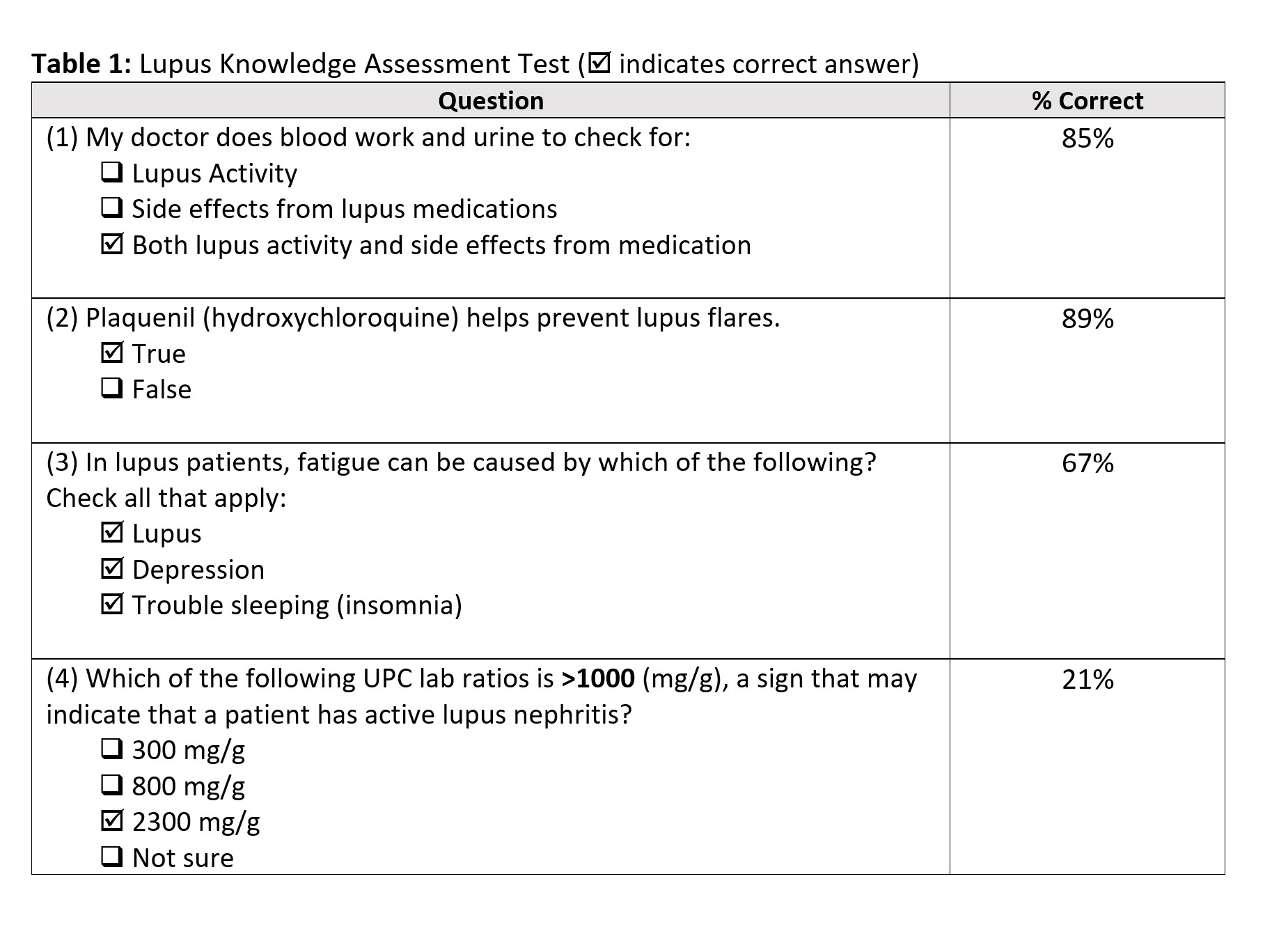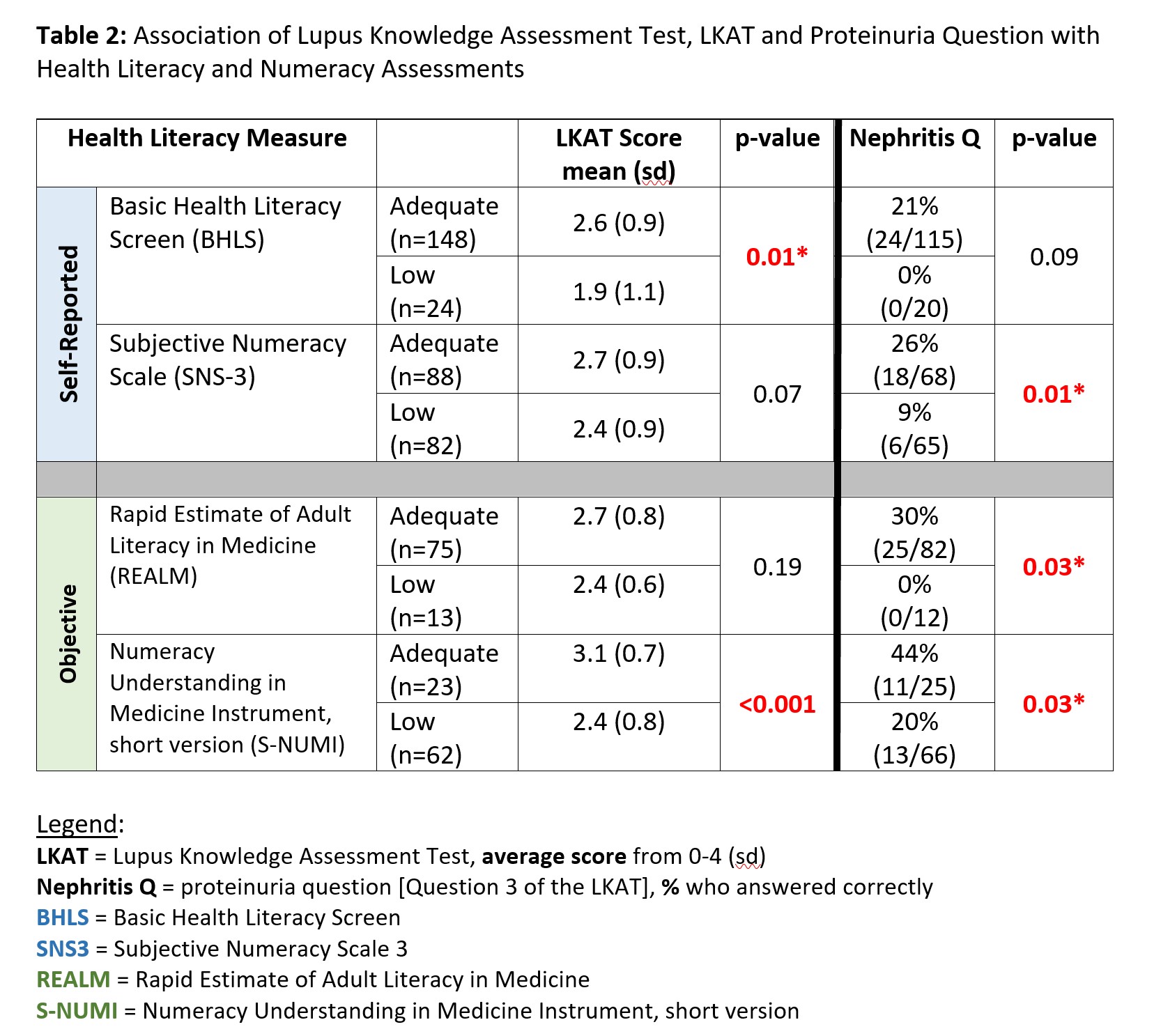Session Information
Date: Friday, November 6, 2020
Title: SLE – Diagnosis, Manifestations, & Outcomes Poster I: Clinical Manifestations
Session Type: Poster Session A
Session Time: 9:00AM-11:00AM
Background/Purpose: Systemic lupus erythematosus (SLE) is an inherently complex disease to manage with heterogenous clinical manifestations and complicated medication regimens. The complexity of lupus self-management combined with low health literacy may contribute to poor outcomes. Nationally, over 33% of American adults have low health literacy. The objective of this project was to determine the level of comprehension of SLE specific knowledge amongst patients with SLE and determine whether this was associated with existing validated measures of health literacy and numeracy.
Methods: SLE patients meeting SLICC criteria were recruited from an academic university clinic from March 2019 through January 2020. A four-item questionnaire, the Lupus Knowledge Assessment Test (LKAT, Table 1), was developed and reviewed by six rheumatologists who see patients in a tertiary center lupus clinic. Health literacy was assessed using the self-reported Basic Health Literacy Screen (BHLS) and numeracy by the 3-item Subjective Numeracy Scale (SNS-3). Additionally, we collected objective health literacy assessments in a subset of patients including the Rapid Estimate of Adult Literacy in Medicine (REALM) and the Numeracy Understanding in Medicine Instrument, short form (S-NUMI).
We defined low health literacy as BHLS < 12 and low numeracy as SNS3 ≤ 14. The LKAT and health literacy assessments were administered during routine clinic visits. Additional patient demographics were gathered by survey. Data was analyzed using descriptive statistics.
Results: 225 SLE patients completed the questionnaire, of which 172 had correlating self-reported health literacy assessments and 89 had objective health literacy assessments. 95% of participants were female; 61% were African American. Table 1 shows the questions comprising the LKAT questionnaire and percentage of correct answers for each question. The majority of patients knew reasons for routine blood and urine monitoring (85%); 67% were able to identify factors contributing to fatigue in SLE. Only 21% were able to answer which urine protein to creatinine (UPC) value was greater than 1000 mg/g correctly (from 300, 800, 2300 mg/g and not sure as choices).
Patients with low health literacy (by BHLS) and low numeracy (by S-NUMI) had lower LKAT scores (p=0.01, p< 0.001). Those with low health literacy (by REALM) and low numeracy (by SNS3 or S-NUMI) were more likely to miss the proteinuria question (p ≤ 0.03, Table 2).
Conclusion: Patients with lower health literacy and numeracy have less knowledge about SLE, as measured by the LKAT (Lupus Knowledge Assessment Test). Patients had specific deficits recognizing factors contributory to fatigue in SLE and understanding proteinuria; only 21% of patients were able to answer which numerical UPC value is greater than 1000 mg/g correctly. This suggests many patients with low numeracy may have difficulty in functional understanding and interpretation of lab results. Further studies are needed to identify association of decreased lupus knowledge and low health literacy with other health outcomes.
To cite this abstract in AMA style:
Maheswaranathan M, Eudy A, Doss J, Sadun R, Criscione-Schreiber L, Sun K, Bailey S, Hastings S, Clowse M, Rogers J. Assessment of Lupus Knowledge Through Creation of the Lupus Knowledge Assessment Test (LKAT) [abstract]. Arthritis Rheumatol. 2020; 72 (suppl 10). https://acrabstracts.org/abstract/assessment-of-lupus-knowledge-through-creation-of-the-lupus-knowledge-assessment-test-lkat/. Accessed .« Back to ACR Convergence 2020
ACR Meeting Abstracts - https://acrabstracts.org/abstract/assessment-of-lupus-knowledge-through-creation-of-the-lupus-knowledge-assessment-test-lkat/


